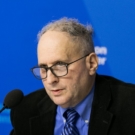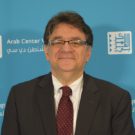Speakers

Shireen Hunter
University Associate
Georgetown University

Kenneth Katzman
Middle East Specialist
Congressional Research Service (speaking in his personal capacity)

Assal Rad
Research Fellow
National Iranian American Council

Barbara Slavin
Director and Nonresident Senior Fellow
Future of Iran Initiative, Atlantic Council
Moderator
Event Summary
On August 8, 2019, Arab Center Washington DC (ACW) organized a panel presentation and discussion at the National Press Club titled “Confrontation in the Gulf: Unpacking Recent Escalations and the Prospects of US-Iran Talks.” ACW Executive Director Khalil E. Jahshan gave a brief welcome and introduced the panel chair, Daniel Brumberg, who is Director of Democracy and Governance Studies at Georgetown University and a Non-resident Senior Fellow at ACW. Brumberg began by saying that he was “mystified by the direction of US policy”—words that reverberated throughout the panel as speakers tried to make sense of the Trump Administration’s handling of relations with Iran as well as Iran’s responses and current political realities.
Brumberg then invited the speakers to offer remarks. The first was Shireen Hunter, who serves as University Associate at Georgetown University. Hunter asserted that Iran does not want war and that the sanctions imposed by the United States on Iran have actually increased the power of Ayatollah Ali Khamenei and the economic role of the Islamic Revolutionary Guard Corps (IRGC). She lamented the “moral dimension” of the sanctions, saying that they are disastrous for the country and are like a “slow death” for the people. She stressed that the Gulf’s problems have become more internationalized because of the Trump Administration’s aggressive policy toward Iran which has affected relations with China and Russia, both of which are on good terms with the Islamic Republic. Iran cannot win a conventional war, she stated, but the shock to the global economy would be profound, necessitating a diplomatic route between Washington and Tehran that should explore productive negotiations. Taking a historical look at American-Iranian relations, she said that what is happening today “is not only a Trump problem”; rather, it is a culmination of a long 40-year process in which US policy toward Iran has been consistently pushing for regime change without war. To Hunter, the United States in the end will have to accept Iran as a regional player; for its part, Iran has to act like a responsible player.
The next speaker, Kenneth Katzman, who is a Middle East Specialist with the Congressional Research Service, said that Iran is probably in the strongest political position today, having rescued Syrian President Bashar al-Assad, boasts strong influences with Hezbollah in Lebanon and proxies in Iraq, and stands up to Saudi Arabia via the Houthis in Yemen. Katzman agreed that Iran does not want war especially since it is now strangled by sanctions, shut out of the international banking system, and facing a GDP decline of 6 to 7 percent this year. He disputed the thesis that Iran can be weakened until it complies with US dictates since there is no evidence to support that. He contended that the European countries have the big burden of keeping the Joint Comprehensive Plan of Action (JCPOA) alive. Indeed, the Iranians have set up a mechanism similar to the European INSTEX (Instrument for Trade and Exchanges) to facilitate trade in order to overcome the current US sanctions. Katzman did not think the Europeans could pump back enough cash into the Iranian economy. However, he said that China probably could because it is flush with cash and wants to join the vehicle and buy Iranian oil. If it does, it would send a critical message and challenge the United States, with which China is currently embroiled in a significant trade conflict.
Assal Rad, a Research Fellow with the National Iranian American Council, questioned the approach to the conflict with Iran that seems to be accepted by many. She said the current framing follows in the footsteps of Orientalism, painting Iran as weak and violent and generally a “bad actor”—as opposed to the United States, a “good actor.” This deprives analysis of important nuance and limits understanding. Washington’s assumption that the decision-makers in Tehran are not rational is belied by a history that illustrates Iran’s prudent decisions, including signing the JCPOA. Rad sees two global threats today that need everyone’s attention: climate change and nuclear proliferation. The JCPOA is a model for future global cooperation and nonproliferation and the current impasse with Iran is a “side show” that deflects from the true crises. Decrying the Trump Administration’s policy toward Iran as incoherent, she said that President Trump should hire new advisors whose opinions are more in line with his; that is, opposed to war with Iran. She emphasized that US sanctions are uniting Iranians behind the regime. Finally, Rad reiterated that the point of origin for any negotiations has to be the United States, which is the party responsible for abrogating the JCPOA. For Trump, she said, the idea of “saving face” would be in not going to war with Iran.
Barbara Slavin, Director and Non-resident Senior Fellow at the Atlantic Council’s Future of Iran Initiative, explained that early in the Trump Administration, advisors urged the president to remain in the nuclear deal with Iran; now, however, he has different—and more hawkish—advisors (especially National Security Advisor John Bolton and Secretary of State Mike Pompeo) who are steering policy toward war. She stated that sanctioning Iran’s Foreign Minister Mohammad Javad Zarif brought the situation to “the height of absurdity,” and showed that negotiations are not encouraged. In general, Slavin concluded that the US policy of maximum noise and pressure has yielded minimum results. There needs to be a face-saving plan on the table for the sake of both Iran and the United States, especially since Trump keeps saying that he wants to withdraw all US troops from the region. She suggested two specific choices for Trump: fire Bolton, which would send the message that US policy is changing, and name an envoy for negotiations with Iran.
Event Photos

